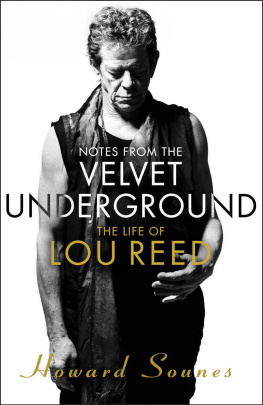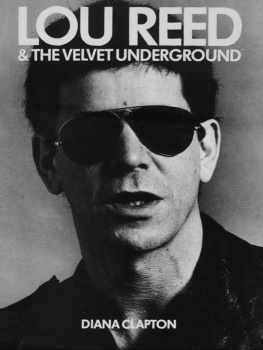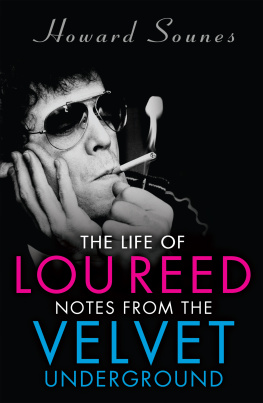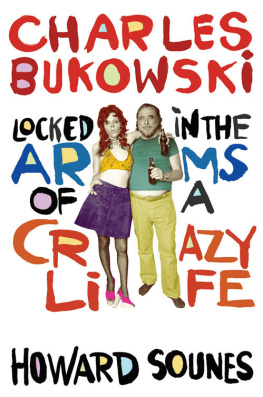Contents
About the Book
Best known as the singer of the pop hit Walk on the Wild Side, Lou Reed was in fact one of the most intelligent and innovative songwriters of his era a sardonic, world-weary chronicler of underground culture and the dark side of human nature.
Starting with the Velvet Underground in the 1960s, Reed combined poetry with rock n roll to create almost fifty years of powerful and challenging music that influenced generations of artists. In this authoritative new book, biographer Howard Sounes shows how Reeds seminal work with the Velvets shaped his whole career.
Sounes reveals a complicated man, and an erratic recording artist, who was frequently quarrelsome and could be downright nasty. He was a bisexual who married three times, an alcoholic and a drug user who portrayed himself as a tough guy, but struggled with mental health issues in private. He was also an astute and sensitive songwriter whose subject matter ranged from drugs and transgressive sex to such tender love ballads as Perfect Day and Pale Blue Eyes.
Through meticulous research, including interviews with over 140 people who played a part in Reeds life, many speaking in public for the first time, Notes from the Velvet Underground is a vivid portrait of a talented but tortured artist.
Also by Howard Sounes
Amy, 27
Fab: An Intimate Life of Paul McCartney
Heist
Seventies
The Wicked Game
Down the Highway: The Life of Bob Dylan
Bukowski in Pictures
Charles Bukowski: Locked in the Arms of a Crazy Life
Fred & Rose
For more information about Howard Sounes and his books, visit his website at www.howardsounes.com
Notes from the Velvet Underground
The Life of Lou Reed
Howard Sounes
TRANSWORLD PUBLISHERS
6163 Uxbridge Road, London W5 5SA
www.transworldbooks.co.uk
Transworld is part of the Penguin Random House group of companies whose addresses can be found at global.penguinrandomhouse.com

First published in Great Britain in 2015 by Doubleday
an imprint of Transworld Publishers
Copyright Howard Sounes 2015
Howard Sounes has asserted his right under the Copyright, Designs and Patents Act 1988 to be identified as the author of this work.
Every effort has been made to obtain the necessary permissions with reference to copyright material, both illustrative and quoted. We apologize for any omissions in this respect and will be pleased to make the appropriate acknowledgements in any future edition.
A CIP catalogue record for this book is available from the British Library.
Version 1.0 Epub ISBN 9781473508958
ISBNs 9780857522665 (hb)
9780857522672 (tpb)
This ebook is copyright material and must not be copied, reproduced, transferred, distributed, leased, licensed or publicly performed or used in any way except as specifically permitted in writing by the publishers, as allowed under the terms and conditions under which it was purchased or as strictly permitted by applicable copyright law. Any unauthorized distribution or use of this text may be a direct infringement of the authors and publishers rights and those responsible may be liable in law accordingly.
1 3 5 7 9 10 8 6 4 2
I
Coney Island Baby
194259
LISTEN. LOU REED has fallen silent. That black-clad curmudgeon, the rock n roll poet they called the King of New York, co-founder of the Velvet Underground band, master of the wry, observational lyric, author of Walk on the Wild Side, Heroin and Sweet Jane, among hundreds of extraordinary and some quite ordinary songs, is dead. Lou lived so fast, he drank so much and he took so many drugs that few expected him to live to seventy-one. But now he has sung his last song. What was he really like?
One quick story serves as a paradigm. In the autumn of 1963, when Lou was twenty-one, he drove to St Lawrence University in upstate New York with his college band to perform at a fraternity weekend. The terms of the engagement were that LA and the Eldorados would play at a student dance on Friday night, then for an hour on a pleasure boat on the St Lawrence River on Saturday afternoon, before performing at a fraternity party in the evening. Im not playing on the boat, Lou announced when they arrived, having decided that this was beneath his dignity. The others looked at their band mate in exasperation. Lou was a slim young man of 140lbs, five foot ten, with simian features, short, stubby fingers, bushy brown hair and clever brown eyes. The left eye was lazy, giving him a sly appearance. He spoke in a whiny, camp voice and gave the general impression of being trouble. He was just a prick, says band mate Richard Mishkin, using a word that many friends chose to describe Lou over the years. Yet he was the heart and soul of LA and the Eldorados, their lead singer and guitarist, and they couldnt go on without him.
You dont have a choice, Richard told him. You are going to play on the boat and be happy They are paying us a lot of money, and you have to do it.
That was not the way to speak to Lou, ever. Mishkin, fuck you! he retorted, thrusting his right hand through a glass door. Lou laughed as he looked at the injury he had done to himself, blood streaming down his arm as he held his hand up.
Because he doesnt have to play now, explains Richard, who took Lou to hospital for stitches. Hes won!
As he would show time and again during his long career, Lou would rather harm himself than be coerced into doing anything he didnt believe in. Such integrity is a mark of a true artist. It also helps explain why Lou never achieved as much success as he craved, or deserved.
This talented, difficult man was born Lewis Alan Reed at Beth-El Hospital in Brooklyn, New York, on Monday, 2 March 1942. A story later emerged that his real name was Louis Firbank, and this name is still cited in books and articles; it is completely erroneous. Some friends called him by his given name of Lewis, which he didnt object to, though he disliked his middle name, but to most people he would always be Lou. Lewis was his name, [but] it wasnt him, says his brother-in-law, Harold Weiner. He was Lou.
The temperature fell below freezing the night Lou was born, bringing snow to the five boroughs of New York City, of which Brooklyn is the second largest and most populous: eighty-one square miles of tightly packed houses, tenements, shops and factories, bisected by pot-holed highways, tram lines and rust-brown elevated train tracks; the teeming borough separated from its more glamorous neighbour, Manhattan, by the East River, spanned by the majestic Brooklyn Bridge. It was wartime and the newspapers were full of stories of Americas struggle with the Japs, as well as the wider world war against the Hitler Axis. The mood at home was patriotic but jittery, with fears of attacks on the mainland. The day after Lou was born, to everyones dismay, the Brooklyn Eagle reported the sinking of a US destroyer by a German U-boat off the coast of New Jersey. The paper also warned its readers that the lights would shine as usual at Brooklyns fun fair, Coney Island, that summer, but at the sound of an alert signal the entire amusement area will be blacked out. In a time that has passed into history, men and women hurrying home from work in the snow were formally dressed, nearly everybody wore a hat and an overcoat and most adults smoked cigarettes. New releases at the cinema included











